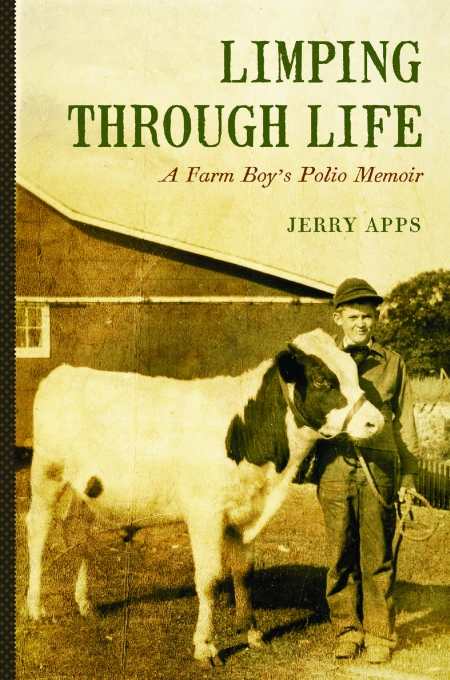Limping through Life
A Farm Boy's Polio Memoir
Before a vaccine existed, polio hit many communities with disability and death. This is the scenario described in Limping Through Life: A Farm Boy’s Polio Memoir, a new book by Jerry Apps.
Growing up on a farm in central Wisconsin, Jerry and his younger brothers tended to the animals and fields. Hard labor was an essential part of living, so when twelve-year-old Apps became ill in January of 1947, his future was threatened. The aftermath of polio could ruin a person, rendering it impossible to make a living or care for a family, much less enjoy the normal activities of youth. Jerry faced these possibilities and fought them with determination.
Apps explains that two forms of the disease can afflict the body. One type incapacitates the respiratory system and kills; the other paralyzes the body to varying degrees. Apps was afflicted by polio in his right leg. He describes the brutal early stages of his recovery, explaining both the psychological and physical toll. Polio kept him out of the classroom, but he still managed to graduate from the eighth grade in the midst of his struggle.
The book launches into Apps’s high school years and then his academic work at the University of Wisconsin-Madison, where he studied agriculture. He later elaborates on his writing career, which was an inspiring success. Fortitude and spirit are evident on every page as he recounts the difficulty of regaining use of his leg and accepting the fact that post-polio syndrome would cause a permanent limp.
His doctor said he was fortunate to be alive, yet Apps reiterates that the long-term effects have not subsided, and this changes how he sees the world: “I have never gotten over believing that I must constantly prove myself so I won’t be seen as worthless.”
Apps credits his father with a tough approach toward rehabilitation, which involved forcing his disabled body to do farming chores. “Tractor driving had been my physical therapy, providing me a very practical motivation: make my leg work, or crash into a fence.” Although this may seem an unusual tactic, Apps avows that it proved effective.
Jerry Apps is a prolific author of environmental fiction and nonfiction, with more than forty years of experience writing on rural topics. He’s a former professor at the University of Wisconsin College of Agricultural and Life Sciences.
Though the memoir veers into material unrelated to his bout with polio, Apps keeps the narrative interesting. His straightforward discussion of his experiences provides an excellent reference for historians seeking information on Wisconsin life in the late 1940s and 1950s. A worthwhile pursuit for anyone fascinated with that time period, reading this honest book will provide details that others less articulate may have missed.
Reviewed by
Julia Ann Charpentier
Disclosure: This article is not an endorsement, but a review. The publisher of this book provided free copies of the book and paid a small fee to have their book reviewed by a professional reviewer. Foreword Reviews and Clarion Reviews make no guarantee that the publisher will receive a positive review. Foreword Magazine, Inc. is disclosing this in accordance with the Federal Trade Commission’s 16 CFR, Part 255.

